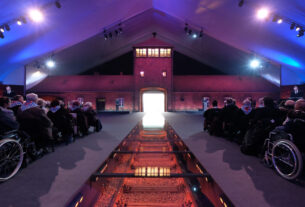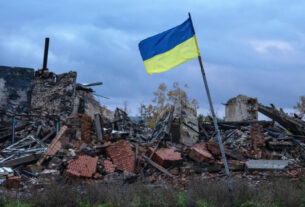(JR) — The war between Israel and Hamas continues to divide the cultural world, as two European film festivals this week found themselves embroiled in controversy over their handling of both Israeli and pro-Palestinian filmmakers.
The Stockholm International Film Festival, in Sweden, apologized Monday for what it said was a “misunderstanding” surrounding a planned guest, Israeli-American filmmaker and actress Aleeza Chanowitz. The festival had planned to have Chanowitz attend a screening this week of her raunchy comedy series “Chanshi,” which she created and stars in as an Orthodox American woman who moves to Israel on a quest for sex with male soldiers.
But in emails Chanowitz first shared with Deadline, organizers walked back the invitation, at first saying the Israeli embassy could no longer provide travel costs, then citing a Swedish Foreign Embassy warning against travel to and from Israel. When she pushed further, organizers at the festival reportedly told her the organization had “to take a stand” and that her appearance at the festival could be an “unpleasant situation.”
“I am surprised by the festival’s cowardice, and it really sucks because I wanted to have a nice time at a cultural event where I could take a break from our scary reality and enjoy and discuss art,” Chanowitz told Deadline. “I also ‘have had to take a stand’; I stand with the Jews, Israelis of all kinds, peace with our neighbors, and most of all with the families of the hostages.”
After the story blew up in the Israeli press, the festival issued an apology and offered to host Chanowitz in a virtual Q&A, according to The Hollywood Reporter. Claiming that “incorrect information” was spread about the reason behind the change, the festival said in a statement, “We are incredibly sorry about this bad communication that has caused pain for the team and for the wider Jewish community.”
While the Stockholm controversy was unfolding, another was taking place in the Netherlands. At the International Documentary Festival Amsterdam, around a dozen filmmakers have pulled their work from the festival’s lineup over its stance on the phrase “From the River to the Sea.”
The collective, along with the Palestine Film Institute, was angry with festival organizers for condemning an opening-night pro-Palestinian protest. At the protest, demonstrators had unfurled a banner reading “From the River to the Sea, Palestine Will Be Free,” a controversial phrase that many argue has historical roots in calls for Israel to be wiped off the map.
Claiming that he had not seen the banner at the time, festival director Orwa Nyrabia was caught on camera applauding the protests. He later condemned the banner after pushback from Israeli filmmakers, who wrote in an open letter, “We see this as a personal attack against us.”
The festival’s eventual statement on the slogan remarked that it “does not represent us, and we do not endorse it in any way. We are truly sorry that it was hurtful to many.” Festival organizers also called for a ceasefire in the Gaza Strip, which Israel has bombarded for more than a month since the Oct. 7 Hamas attacks, and for humanitarian aid to enter the region.
After announcing that stance, several pro-Palestinian filmmakers announced they would be pulling their films from the event, including at least one Iranian director.
“I am heartbroken, betrayed, and outraged by the damaging slander of the slogan ‘From the River to the Sea,’” Iranian filmmaker Maryam Tafakory announced on Instagram as she pulled her film. “To call this slogan ‘hurtful’ is to be against the end of occupation.”
The Palestine Film Institute, which pulled out of plans to showcase several films and participate in the festival’s marketplace, issued its own statement saying the festival “unjustly criminalizes Palestinian voices and narratives.” While the phrase has been criminalized in Germany, the institute said it has not been banned in the Netherlands. The institute later issued another statement praising the festival for supporting a ceasefire.
Among the films the institute had slated to show at the festival was “Bye Bye Tiberias,” a documentary about the family of Palestinian-Israeli-French actress Hiam Abbass, best known for her role in the HBO series “Succession.”
The controversies in Stockholm and Amsterdam mirrored other debates around Israel that have unfolded in arts and culture spaces, including at the 92NY in New York City and among the staff of the art magazine Artforum. In both cases, blowback to Israel-critical open letters resulted in staff at the institutions either resigning or being fired.




